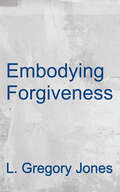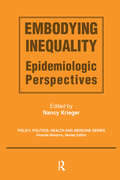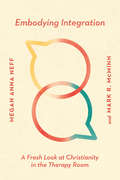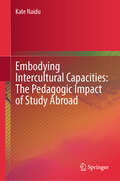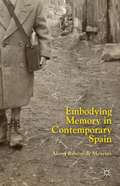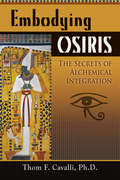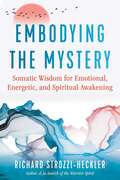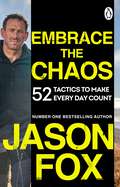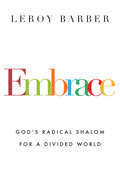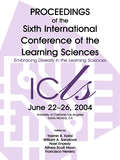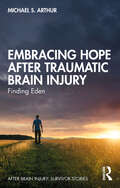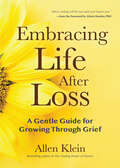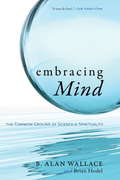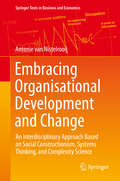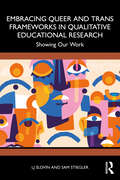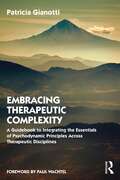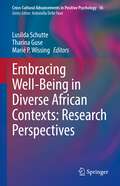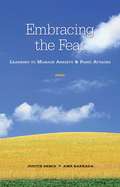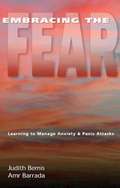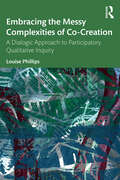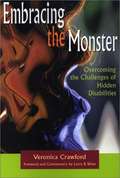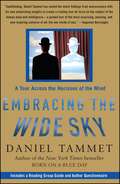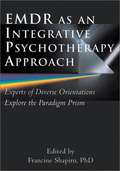- Table View
- List View
Embodying Forgiveness: A Theological Analysis
by L. Gregory JonesA topic unjustly neglected in contemporary theology, forgiveness is often taken to be either too easy or too difficult. On the one hand is the conception of forgiveness that views it mainly as a move made for the well-being of the forgiver. On the other hand, forgiveness is sometimes made too difficult by suggestions that violence is the only effective force for responding to injustice. In this exciting and innovative book, L. Gregory Jones argues that neither of these extreme views is appropriate and shows how practices of Christian forgiveness are richer and more comprehensive than often thought. Forgiveness, says Jones, is a way of life that carries with it distinctive concepts of love, community, confession, power, repentance, justice, punishment, remembrance, and forgetfulness. In Part 1 of Embodying Forgiveness Jones first recounts Dietrich Bonhoeffer's own struggle against the temptation to make forgiveness either too easy or too difficult in his thought and, even more, in his life and death at the hands of the Nazis. Jones then considers each of these temptations, focusing on the problem of "therapeutic" forgiveness and then forgiveness's "eclipse" by violence. Part 2 shows why a trinitarian identification of God is crucial for an adequate account of forgiveness. In Part 3 Jones describes forgiveness as a craft and analyzes the difficulty of loving enemies. He deals particularly with problems of disparities in power, impenitent offenders, and the relations between forgiveness, accountability, and punishment. The book concludes with a discussion of the possibility of certain "unforgiveable" situations. Developing a strong theological perspective on forgiveness throughout, Jones draws on films and a wide variety of literature as well as on Scripture and theological texts. In so doing, he develops a rich and comprehensive exploration of what it truly means to embody Christian forgiveness.
Embodying Inequality: Epidemiologic Perspectives (Policy, Politics, Health and Medicine Series)
by Nancy KriegerTo advance the epidemiological analysis of social inequalities in health, and of the ways in which population distributions of disease, disability, and death reflect embodied expressions of social inequality, this volume draws on articles published in the "International Journal of Health Services" between 1990 and 2000. Framed by ecosocial theory, it employs ecosocial constructs of "embodiment"; "pathways of embodiment"; "cumulative interplay of exposure, susceptibility, and resistance across the lifecourse"; and "accountability and agency" to address the question; and who and what drives current and changing patterns of social inequalities in health.
Embodying Integration: A Fresh Look at Christianity in the Therapy Room (Christian Association for Psychological Studies Books)
by Megan Anna Neff Mark R. McMinnDiscussing spirituality and religion in the therapy room is increasingly accepted, some even forgetting that integration of psychology and Christianity was once a rare thing.Embodying Integration
Embodying Intercultural Capacities: The Pedagogic Impact of Study Abroad
by Kate NaiduThis book examines the extent to which in-country education contributes to the development of intercultural capacities among students and investigates how this occurs. It examines the experiences of Australian university students participating in educational programs in Indonesia and critiques and extends notions of interculturality. The potential development of intercultural capacities is explored in relation to four key themes: pedagogy, temporality, home, and culture. The book demonstrates that interculturalisation is not an automatic or guaranteed result of simply being ‘immersed’ in-country, but rather involves an array of pedagogic processes (involving both human and non-human actors). It outlines the temporal dimensions of in-country education, examining the experience as part of a broader trajectory, involving significant moments, and a range of engagements with diverse temporal rhythms. The book concludes by exploring how students’ understandings of ‘culture’ and ‘cultural difference’ impact the way in which the study-abroad experience is navigated. Readers will gain a deepened understanding of how intercultural capacities develop, which can be applied to other educational contexts including schools, as well as corporate and not-for-profit settings. Those interested in sociology, particularly Bourdieusian analysis, will also benefit from this empirical application (and extension) of the notion of habitus in the context of student mobility. “This is a well conceptualized and beautifully written book that explores how study abroad programs can play an important role in equipping young people to navigate the super-diversity that has now become a critical feature of societies around the world. It shows how such programs have the potential to enhance intercultural capacities, especially when crafted in ways that are thoughtfully fashioned and carefully enacted.” — Fazal Rizvi, University of Melbourne Australia
Embodying Memory In Contemporary Spain
by Alison Ribeiro de MenezesThis innovative book examines the emergence of a memory discourse in Spain since the millennium, taking as its point of departure recent grave exhumations and the "Law of Historical Memory. " Through an analysis of exhumation photography, novels, films, television, and comics, the volume overturns the notion that Spanish history is pathological.
Embodying Osiris
by Thom F CavalliThe modern Western movement to embrace Eastern spiritual traditions usually stops with India and the Orient. Westerners have yet to discover the wisdom that dates back even further to ancient Egypt. With a Jungian perspective, clinical psychologist Dr. Thom F. Cavalli plumbs that wisdom through the myth of Osiris, the green-skinned Egyptian god of vegetation and the Underworld. As no one else has done, Cavalli draws on Osiris's death and resurrection as a guide to spiritual transformation. The myth represents the joining of the conscious and the unconscious, the light and the dark, life and death, and shows how to live our temporal existence in service to and anticipation of eternal life. Cavalli sees the ancient art of alchemy -- which attempted to turn lead into gold -- as the key. The alchemical recipe "solve et coagula" (solution and coagulation) encoded in the myth describes the integration of all parts of a person and the method for achieving an experience of immortality in life and eternal life after death. The Osiris myth thus provides a model for the contemporary quest for individuation, the Jungian term for integrating ego and self, body and soul, in the process of becoming whole.
Embodying Osiris
by Thom F. CavalliThe modern Western movement to embrace Eastern spiritual traditions usually stops with India and the Orient. Westerners have yet to discover the wisdom that dates back even further to ancient Egypt. With a Jungian perspective, clinical psychologist Dr. Thom F. Cavalli plumbs that wisdom through the myth of Osiris, the green-skinned Egyptian god of vegetation and the Underworld. As no one else has done, Cavalli draws on Osiris's death and resurrection as a guide to spiritual transformation. The myth represents the joining of the conscious and the unconscious, the light and the dark, life and death, and shows how to live our temporal existence in service to and anticipation of eternal life. Cavalli sees the ancient art of alchemy - which attempted to turn lead into gold - as the key. The alchemical recipe "solve et coagula" (solution and coagulation) encoded in the myth describes the integration of all parts of a person and the method for achieving an experience of immortality in life and eternal life after death. The Osiris myth thus provides a model for the contemporary quest for individuation, the Jungian term for integrating ego and self, body and soul, in the process of becoming whole.
Embodying the Mystery: Somatic Wisdom for Emotional, Energetic, and Spiritual Awakening
by Richard Strozzi-Heckler• Follows the author&’s apprenticeships with masterful teachers, out-of-body experiences, meditation retreats in Asia, martial arts in Japan, facing his trauma at the hands of his father, and his struggles to become emotionally literate • Offers interpretations of his experiences poised as questions, reflections, and inquiries, inviting the reader to participate in what opened for the author on his quest for self-realization, including successes, failures, struggles, and enigmas Sharing profound stories, transformative incidents, and provocative situations from across his more than seven decades of life, founding elder of the Somatics movement Richard Strozzi-Heckler explores the moments of insight and awakening that have been pivotal in forming his unique perspectives within the fields of embodiment, meditation, Aikido, and leadership. Beginning with an early experience with death that revealed the universal principle of impermanence, the author takes us on a rich, textured journey into the inquiry of what it means to embody the mystery of spirit. As we follow him through apprenticeships with masterful teachers, out-of-body experiences, meditation retreats in Asia, martial arts in Japan, facing his trauma at the hands of his father, and his struggles to become emotionally literate, we&’re also taken on a path of learning, healing, and transformation. For each story, the author offers interpretations of his experiences poised as questions, reflections, and inquiries, rather than being distilled into direct lessons. In this way we are invited to participate in the author&’s reflections on what opened for him on his quest for self-realization, including successes, failures, struggles, and enigmas. The author demonstrates how his experiences unified and informed him professionally and personally, opening the possibilities of an emotional, energetic, and spiritual awakening by living the embodied life. A deeply personal and intimate portrayal of a life&’s journey through a somatic wisdom, this insightful memoir depicts the immeasurable wealth that teachers, practices, vulnerability, and community can offer the sincere seeker on an embodied spiritual path.
Embrace the Chaos: The brand new motivational book to help you master the power of habits and transform your life, from the author of Battle Scars
by Jason FoxTHE INSTANT SUNDAY TIMES BESTSELLER.Discover how to become the best version of yourself with this game-changing, personal development plan from the star of Channel 4’s SAS: Who Dares Wins and author of Battle Scars and Life Under Fire.‘A motivational masterclass with a proven framework for improving every day.' Aldo KaneChallenge your limits, change your habits and transform your life.In Embrace the Chaos, Special Forces veteran Jason Fox sets out a revolutionary programme of personal challenges designed to help you reboot, disrupt your thinking, and grow your capabilities.Across 52 short chapters of practical advice - battle-tested on elite military operations and extreme expeditions - Foxy mentors you through a series of tasks that will enhance your life.These exercises range from micro-adventures and small habit changes to addressing your routine, cleansing your relationships, setting personal goals and learning new skills.In this life-changing book you’ll find:- A new challenge for every week of the year.- Practical advice and tips.- Physical and creative tasks.- Mentoring guidance through each process.Whether you’re looking for adventure, in need of mental clarity, or seeking military grade productivity, Embrace the Chaos will push you physically and mentally to become the best version of yourself.
Embrace: God's Radical Shalom for a Divided World
by Leroy BarberThe walls between us seem impenetrable. We live in an age of strife and division. Factors such as race, class, values and lifestyles keep us from connecting with others in meaningful ways. It's easy to avoid or ignore those who make us uncomfortable and those we simply do not like, but God's call to the church is to do just the opposite. Leroy Barber has spent decades pursuing reconciliation and justice amongst groups of vastly diverse people. He knows the challenge of embracing those who are difficult to embrace, yet he advocates that the way to radical shalom on earth is through pursuing these relationships. We have the opportunity as the people of God to bring true peace and unity to a world that desperately needs it. Embrace the challenge to show a divided world the bridge-building power of God's love.
Embracing Diversity in the Learning Sciences: Proceedings of the Sixth International Conference of the Learning Sciences
by Yasmin B. Kafai Francisco Herrera William A. Sandoval Noel Enyedy Althea Scott NixonMore than a decade has passed since the First International Conference of the Learning Sciences (ICLS) was held at Northwestern University in 1991. The conference has now become an established place for researchers to gather. The 2004 meeting is the first under the official sponsorship of the International Society of the Learning Sciences (ISLS). The theme of this conference is "Embracing Diversity in the Learning Sciences." As a field, the learning sciences have always drawn from a diverse set of disciplines to study learning in an array of settings. Psychology, cognitive science, anthropology, and artificial intelligence have all contributed to the development of methodologies to study learning in schools, museums, and organizations. As the field grows, however, it increasingly recognizes the challenges to studying and changing learning environments across levels in complex social systems. This demands attention to new kinds of diversity in who, what, and how we study; and to the issues raised to develop coherent accounts of how learning occurs. Ranging from schools to families, and across all levels of formal schooling from pre-school through higher education, this ideology can be supported in a multitude of social contexts. The papers in these conference proceedings respond to the call.
Embracing Hope After Traumatic Brain Injury: Finding Eden (After Brain Injury: Survivor Stories)
by Michael S. ArthurThis important book provides a firsthand account of a university professor who experienced traumatic brain injury. It tells the story of Michael Arthur, who had recently accepted a position as vice principal of a new high school. After only two weeks on the job, he was involved in a car accident while driving through an intersection in northern Utah. Through his personal account, he takes the reader into the dark interworkings of his mind as he tries to cope with his new reality. He provides insight into how he learned how to process information and even speak without stumbling on his words while also sharing how his significant relationships suffered as he tried to navigate the restless seas of doubt while trying to circumvent his unyielding symptoms. The book is about finding optimism and gaining insight into the struggles of the brain-injured patient and about trying to understand the perspectives of loved ones who can’t quite grasp the idea of an invisible injury. From the sudden onset of garbled speech to the challenges of processing information, the changing dynamic of the author’s life is highlighted to help family members and healthcare workers better understand.
Embracing Hope: On Freedom, Responsibility & the Meaning of Life
by Viktor E. FranklA highly anticipated, rediscovered collection from Viktor Frankl, published for the first time in the United States, exploring freedom, responsibility, and how we can draw meaning from the temporary nature of our livesFrom the bestselling author of Man's Search for Meaning, which has sold over 18 million copiesThe Library of Congress lists Man&’s Search for Meaning as one of the ten most influential books in history. Scientists and artists, politicians and celebrities regularly cite Frankl as one of the most important authors every person should read. Now, there is another book for his devoted fans to add to their collections.Published here for the first time in the United States, Embracing Hope continues Frankl&’s enduring life&’s work and provides even more lessons for those searching for meaning and purpose. It&’s made up of four distinct pieces from Frankl on different themes - all uniting around the idea that we should remain open to life even when we have been subjected to appalling injustice, and even when we are faced with our own mortality and the brief nature of our lives. At a time of global suffering where so many are searching for hope and meaning, Frankl&’s work seems more relevant and more important than ever.Whether you're a devoted follower of Frankl's work or a newcomer seeking to enrich your understanding of life's purpose, this book promises a captivating journey that will leave you pondering its teachings long after you've turned the final page.Just imagine what would happen, what life would look like, if there were no death. Imagine what it would be like if you could postpone anything and everything, if you could put it off for eternity. You wouldn't have to do anything today or tomorrow. Everything could just as easily be done next week, next month, next year, in a decade, in 100 or 1,000 years. Only in the face of death, only under pressure from the finiteness, the temporal limitation of human existence, is there any point in going about our business, and not only in going about our business, but in experiencing life, and not only in experiencing life but also in loving someone, and even in enduring and surviving something that is inflicted on us.
Embracing Life After Loss: A Gentle Guide for Growing Through Grief
by Allen Klein#1 New Release in Grief & Loss - Learn to Laugh When You Feel Like CryingReaders of When Breath Becomes Air, Present Over Perfect and Feeling Good will be inspired and encouraged by Embracing Life after Loss.Work through the depression of grief and loss with resilience: Losing a loved one is never easy. Allen Klein knows how it feels—just like you, he's lost many loved ones in his life. Inspired by Klein's experience with the loss of his wife, Embracing Life after Loss will help you to recover from grief and loss—just like Klein did.Learn how to laugh again: You never forget the people you lose. But you can grow stronger, wiser, and more appreciative of life as you move forward. And, believe it or not, you can even laugh again. Embracing Life after Loss will show you how to smile through the difficult times—how to take a break from the pain of your loss and find joy in life again.Rediscover joy with the world’s only Jollytologist®: Winner of the Lifetime Achievement Award from the Association for Applied and Therapeutic Humor, Allen Klein is the perfect person to teach you how to find joy and happiness. Discover why Comedian Jerry Lewis has said that Allen Klein is “a noble and vital force watching over the human condition.”Embracing Life after Loss is a steadfast compass that offers hope and resilience to anyone trying to navigate through dark times. Allen Klein illustrates five practical steps for recovering from depression caused by grief and loss:LosingLearningLetting GoLivingLaughingLaughter and humor are some of God’s gifts to overcome your trials and tribulations. Learn to laugh again with Embracing Life after Loss.
Embracing Mind: The Common Ground of Science and Spirituality
by B. Alan Wallace Brian HodelWhat is Mind? For this ancient question we are still seeking answers. B. Alan Wallace and Brian Hodel propose a science of the mind based on the contemplative wisdom of Buddhism, Hinduism, Taoism, Christianity, and Islam.The authors begin by exploring the history of science, showing how science tends to ignore the mind, even while it is understood to be the very instrument through which we comprehend the world of nature. They then propose a contemplative science of mind based on the sophisticated techniques of meditation that have been practiced for thousands of years in the great spiritual traditions. The final section presents meditations that are of universal relevance--to scientists and people of all faiths--for revealing new dimensions of consciousness and human flourishing. Embracing Mind moves us beyond the dogmatic debates between theists and atheists over Intelligent Design and Neo-Darwinism, and it returns us to the vital core of science and spirituality: deepening our experience of reality as a whole.
Embracing Organisational Development and Change: An Interdisciplinary Approach Based on Social Constructionism, Systems Thinking, and Complexity Science (Springer Texts in Business and Economics)
by Antonie van NistelrooijThis book focuses on human behavioural processes and describes them from an interdisciplinary perspective. It introduces readers to the main theories and approaches in the field of organisational development and change (ODC), and discusses their relevance and purpose with a clear focus on improving how readers perceive and handle change. The book is tailor-made for business students without any background in the humanities, helping them to conceptualise organisational development and change, and to practically organise interventions to increase organisational effectiveness. The book’s goal is to help future managers and consultants recognise and handle the ‘full situation’, which includes purposes, people and relationships. Furthermore, it elaborates on those theories and instruments that can deliver real benefits to real people working in real fuzzy and complex circumstances, and includes several practical cases focusing on the role of the interventionist.
Embracing Queer and Trans Frameworks in Qualitative Educational Research: Showing Our Work
by Sam Stiegler LJ SlovinEmbracing Queer and Trans Frameworks in Qualitative Educational Research reflects on a decade of conversations about research, thinking, and life, exploring how to navigate the ethical complexities of working with queer and trans youth as queer and trans scholars. The authors introduce the framework of “showing our work,” an intimate approach that revisits the often- invisible processes behind what becomes the ‘final’ product. This lens offers a fresh, rarely told account of how research is made, highlighting the messy, reflective, and transformative moments that shape scholarly inquiry.By showing their work, the authors invite educational researchers to engage with these moments in their own practice – thinking alongside the discussions and decisions that shape methodological choices. They argue for the vital role of queer and trans methodologies in qualitative educational research, positioning them not just as subjectspecific tools but as critical lines of analytical inquiry. Drawing from their own research with queer and trans youth, both within and beyond educational spaces, the authors revisit and reimagine pivotal moments that challenged, provoked, and ultimately shaped key elements of their published work. Through this process, they create a generative space for methodological reimagining, situating ethnographic work with queer and trans youth as fertile ground for new ways of knowing.This book is essential reading for students across disciplines, as well as qualitative researchers engaged in youth studies, critical methodologies, sociology, and queer and trans studies.
Embracing Therapeutic Complexity: A Guidebook to Integrating the Essentials of Psychodynamic Principles Across Therapeutic Disciplines
by Patricia GianottiIn an era where instant gratification has filtered into training programs geared toward technique-driven solutions, Embracing Therapeutic Complexity takes a step back and re-introduces fundamental touchstones that enable clinicians to apply an integrative treatment model in the service of in-depth healing and growth. Using attachment theory as a bridge, this text connects key principles and practices that cut across various therapeutic disciplines and combines them into a unified framework where readers do not have to "put aside" their expertise in order to benefit from the skill sets provided in this book. In addition, this text addresses the impact that power and privilege have had on shaping our psychological constructs, and it challenges cultural assumptions and blind spots that have shaped our treatment approaches in the past. Furthermore, this book illustrates how the application of psychodynamic principles can be combined with advances in trauma treatment, thus offering a practical guide for both beginning and seasoned therapists to amplify and expand their current clinical expertise.
Embracing Well-Being in Diverse African Contexts: Research Perspectives (Cross-Cultural Advancements in Positive Psychology #16)
by Marié P. Wissing Lusilda Schutte Tharina GuseThis is the first volume providing a research platform to showcase research in the field of positive psychology and well-being science in African contexts. Next to enhancing context-sensitive theory and practice on the African continent, it also contributes to the global discourse in positive psychology and facilitates the development of a science that reflects and is relevant to complexity and diversity in a globalising society. This volume brings together work from African scholars, featuring research on theoretical perspectives on well-being in Africa, measurement of well-being in Africa, manifestations and dynamics of well-being in Africa, and well-being promotion in Africa. It stimulates further research in positive psychology and well-being science in the African context and globally, and emphasises the interconnectedness and situatedness of human functioning and well-being, contributing to a more balanced perspective on well-being in an international perspective. The volume benefits researchers, students and practitioners in Africa and other international contexts who study or apply the science of positive psychology and well-being in diverse contexts.Chapter 1 is available open access under a Creative Commons Attribution 4.0 International License via link.springer.com.
Embracing the Fear: Learning To Manage Anxiety & Panic Attacks
by Judith Bemis Amr BarradaA compassionate look into managing anxiety disorders, simple phobias, panic disorders, and agoraphobia, Embracing the Fear offers effective techniques in visualization, meditation, and inner-dialogue.A compassionate look into managing anxiety disorders, simple phobias, panic disorders, and agoraphobia, Embracing the Fear offers effective techniques in visualization, meditation, and inner-dialogue. The book and audiocassette (sold separately) help us accept and change panic and avoidance responses, and assist us in identifying anxiety triggers.
Embracing the Fear: Learning to Manage Anxiety and Panic Attacks
by Judith Bemis Amr BarradaA compassionate look into managing anxiety disorders, simple phobias, panic disorders, and agoraphobia, Embracing the Fear offers effective techniques in visualization, meditation, and inner-dialogue. This book helps us accept and change panic and avoidance responses, and assists us in identifying anxiety triggers.
Embracing the Messy Complexities of Co-Creation: A Dialogic Approach to Participatory Qualitative Inquiry
by Louise PhillipsCo-creation in participatory, qualitative research has become commonplace. It supports a myriad of collaborative practices – from service-user involvement in health and social care, to community capacity-building, to bottom-up climate change projects. With its democratic ambitions, transformative power and (in some contexts) goals of social justice, co-creation has much to offer, particularly in these challenging times… but it is also complex and full of tensions.This book offers an approach which recognises - and embraces - the messy complexities of co-creation. The approach is constructive – it revolves around creating openings for multiple voices; and, in particular, the voices of people with lived experience. And it is critical – it involves integrating critical, reflexive analyses of the intrinsic tensions in co-creation into the practice of research. The book brings participatory research into dialogue with poststructuralist, social constructionist and new materialist, posthumanist strands of qualitative inquiry. In an engaging and accessible way, the author weaves together personal storytelling and more detached analysis to illustrate her approach to producing and communicating knowledge as intertwined processes.The book is written for all students and researchers with an interest in collaborative research practice.
Embracing the Monster: Overcoming the Challenges of Hidden Disabilities
by Veronica CrawfordWhat is it like to live with disabilities no one can see? Readers will find out in this honest and gripping narrative of one woman's life with hidden disabilities--including learning disabilities, ADHD, and bipolar disorder. Yet this is more than just her story of battling adversity and coming out a winner.
Embracing the Wide Sky: A Tour Across the Horizons of the Mind
by Daniel TammetOwner of "the most remarkable mind on the planet," (according to Entertainment Weekly) Daniel Tammet captivated readers and won worldwide critical acclaim with the 2007 New York Times bestselling memoir, Born On A Blue Day, and its vivid depiction of a life with autistic savant syndrome. In his fascinating new book, he writes with characteristic clarity and personal awareness as he sheds light on the mysteries of savants' incredible mental abilities, and our own.
Emdr As An Integrative Psychotherapy Approach: Experts Of Diverse Orientations Explore The Paradigm Prism
by Francine ShapiroEMDR originator Francine Shapiro explores the latest developments and theoretical perspectives on, and clinical implications of, this complex psychotherapy approach originally developed to treat post-traumatic stress disorder. Leading spokespersons of all major schools of psychotherapy explore how EMDR meshes with their approaches, identifying the elements and outcomes salient to their world view. They offer guidelines and techniques, amply illustrated, across a range of problems and disorders, including depression, attachment disorder, social phobia, generalized anxiety disorder, body image disturbance, marital discord, and existential angst. From this diversity of viewpoints emerges a picture of similarities, differences, and strengths across disciplines and suggestions and opportunities for more robust and comprehensive treatment.
